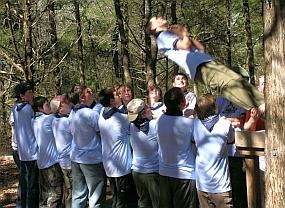I miss reading Michael Spencer, the late, lamented Internet Monk. Since his passing, I don’t read his site as much, though Spencer’s successor, Chaplain Mike, does have a worthy post from time to time.
A post there that has drawn attention, Pastor Piper Scares the Kids, drew mine, and while many commenters have enjoyed ganging up on an ill-conceived children’s message from noted pastor John Piper, there’s another aspect to the Piper illustration I wish to address. So, go read that post, and I’ll wait for you.
{Thumb twiddling…}
Back? Good.
Now for my thoughts.
If there is a sin in the Piper illustration of the little boy jumping from a diving board to escape a vicious dog, it’s not really in the plethora of sub-images that riled the commenters at Internet Monk. For me, it’s the ubiquitous primary image of the “leap of faith” that Christians seem to always fall back upon when talking about how faith in God works.
This idea of a person confronted with a difficult decision hurling his person from a high place only to be caught by a faithful God could not be a more abyssmal illustration. Why the Church insists on using it is beyond me.
Here’s the major problem with the “leap of faith” analogy:
Then the devil took [Jesus] to the holy city and set him on the pinnacle of the temple and said to him, “If you are the Son of God, throw yourself down, for it is written, “‘He will command his angels concerning you,’ and “‘On their hands they will bear you up, lest you strike your foot against a stone.'” Jesus said to him, “Again it is written, ‘You shall not put the Lord your God to the test.'”
—Matthew 4:5-7 ESV
See the problem? The Enemy comes to tempt Jesus and asks Him to make a leap of faith. Jesus replies that He (and by extension, we) knows better than to test God that way.
Hmm.
Smart people would say that pretty much should end the whole idea of the leap of faith motif. Jesus says don’t test God like that.
How is it, then, that we’ve made the leap of faith the cornerstone of how we explain faith in God to others? And why is it we persist in doing something we should not do, testing God again and again? And how is it possible that we use this image as a way to encourage people facing difficult choices?
We need to stop using the leap of faith as an illustration of putting our faith in God. It simply is not biblical.
You’d think that would be the end of this post, but I have a bit more to add that I think is important.
Some of you remember the 1980s. (And some of you are trying to forget them, but bear with me…)
I spent most of the 1980s working both in summer and in year-round Christian camping ministry. At one camp, I was put in charge of the challenge course, a nicely designed set of outdoor tasks used in team-building exercises. Being the sole extrovert of the group that handled outdoor education at the camp, I was pretty much assured of the job by default.
I led church groups, youth groups, school groups, homeschool groups, and business teams through the course. We had a high wall the team had to get over under certain conditions, water crossings they had to make without getting wet, and so on.  The course had about a dozen stations, the last of which was a trust fall.
The course had about a dozen stations, the last of which was a trust fall.
Ah, the trust fall. The leap of faith made concrete.
The trust fall station was a platform about six feet off the ground. People would climb the platform, turn their back to the rest of the group, and fall horizontally into the outstretched arms of their waiting team below.
I monitored this process like I was in charge of handling 10 pounds of weapons-grade plutonium. I never participated with a group, but I ran them through the safety procedures like a drill sergeant. On my watch, no one was ever dropped or ever came close. Not even the 450-pound woman who made the platform groan, though I definitely inserted myself into the group catching her.
Can you predict what’s coming?
One day, a youth group I’d grown attached to over the week convinced me to take the fall and let them catch me. I’d done the fall with members of the camp staff before, so it wasn’t like I was new to the experience myself, so despite my Spidey sense a-tingling, I climbed the platform. I told myself there were half dozen adults with the group, so it’s wasn’t like I was entrusting myself to a bunch of 13-year-old kids solely.
I ran through the safety steps, did the countdown, and took that leap of faith into the certainly waiting arms of the group.
Now, I didn’t hear anyone yell, “Squirrel,” but somehow the group’s attention wandered elsewhere, and I hit the ground flat from six feet up, having felt a grand total of one arm brush past me on the way down.
Imagine being hit from behind with 10-dozen sledgehammers. The ground shook like it was the end of the world. So did I. Ouch.
It was a darned good thing I had hit perfectly flat, because if I had rotated just a bit too much and landed on my neck, I might be writing from a wheelchair today.
I’ll come back to that scene of near-personal-destruction in a moment.
We in the Church use the leap of faith to encourage fellow Christians to put their faith in God when faced with a difficult decision that indeed requires faith to address. But for those of us not making that leap, where are we in that decision-making process, its follow-through, and aftermath?
Here’s the thing: Some people who make such leaps end up dashed on the rocks below.
While it was not quite rocks for me in that trust fall moment, it was packed, hard ground. The aftermath of my collision with cold, hard reality included screaming girls, people running around, and adults yelling, “Omigod, omigid, omigod…” over and over and over. In short, pandemonium.
But how do we react in the Church when someone we encourage to jump and put their faith in God is NOT caught by the faithful God we insist will be there but instead meets the packed, hard ground?
My experience? Most of the time we go on as if nothing happened.
You would think that after encouraging the leap and witnessing the horror of a collision with the earth, pandemonium would break out and we would scream and start calling for help. That’s what the group did that dropped me. Once the initial panic subsided, everyone eventually settled into triage mode. If people had simply wandered off, whistling as they went, we would think something was seriously wrong in the moral lives of those people. It was bad enough that this big 6′ 4″, 200-pound man was dropped by 20 people, but for them to walk away as if nothing had happened would border on criminal.
And yet that happens to people in the Church who make a leap of faith and end up smashed to pieces. Many are simply left to tend to their own predicament alone, while the Church wanders off as if nothing happened, ready to tell the next leaper to jump.
We can’t do that. It’s morally reprehensible.
A few warnings about how we Christians approach dealing with people facing difficult choices that require faith:
1. If we are faced with others ready to take a leap of faith, we better darned well understand from how high they are jumping and just what awaits them below before we give them the thumbs up.
2. If we are not prepared to face that faithful decision as a co-“jumper” with the person faced with a leap, we should never tell another person to hurl himself or herself off the cliff. Ever.
3. If we are not prepared to deal with the aftermath of a leap, then we must stop advising others to jump.
Personally, I am dead sick tired of watching Christians plunge to their doom because of the leap of faith mentality we have in the Church. In real life, there’s something sick about the person who tries to convince the person on the ledge of a high building to jump off. I don’t think that Christianizing a figurative jump is any better. And I think that casually walking away from the aftermath of a fall that didn’t end with the jumper nestled sweetly in the arms of God is the sickest response of all.
Can we grow up a little and start being a collective body of believers? Can we start doing a better job of dealing with fellow Christians who go out in faith and come back in little shards? Because it happens. If it didn’t happen, there would be no faith element to it. There would be no risk.
How we deal with the aftermath of people who do come back in pieces says everything about what we really believe. And what I’m seeing isn’t pretty.
But for all I just wrote, there’s that truth from Jesus again: Don’t test God by jumping from high places.
I wish we could just drop the leap of faith mentality. If Jesus said not to test God that way, then we shouldn’t. Period.
Time to come up with a more mature attitude toward faith and the aftermath of decisions made in faith.
 I listened to a message recently that told me all the things I had to do so I could be godly.
I listened to a message recently that told me all the things I had to do so I could be godly.
 The course had about a dozen stations, the last of which was a trust fall.
The course had about a dozen stations, the last of which was a trust fall.